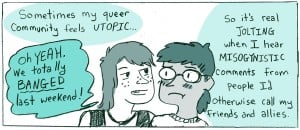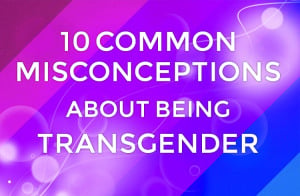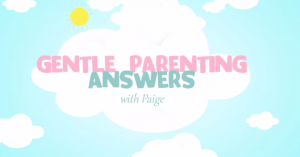Wondering why feminists “don’t care about” something horrible that’s happening in the world? Before you hit “send” on your complaint about why our silence is the reason you hate feminism, we need to talk.
If the following scenario sounds familiar, this conversation’s for you.
You hear about a man who’s abused by his partner and finds nowhere to turn for help. Or about a white woman who’s gang raped, and her attackers are men of color. Or about starving children on the other side of the globe.
And instead of tragedy, you see opportunity – now’s your chance to prove you’ve been right all along.
You take to feminist pages, racial justice pages, anywhere you can find those “social justice warriors” whose anti-oppressive values bother you. And you bring up what you heard to make your case.
See? Feminists say they want equality, but you get nothing but crickets from them when it’s men who are struggling!
See? Feminists don’t actually care about rape victims – they’re all about making up imaginary “rape culture” to fit their man-hating agenda.
See? Feminists are so busy with first world problems that they don’t care about real suffering!
If any of this sounds familiar, you need to stop and think about what you’re doing before you see the next tragedy as an opportunity to put down feminism and other movements for justice.
As someone who works for a feminist publication and writes about intersectional issues of oppression, I get far too many of these messages. In my writing, I focus primarily on my perspective as a queer Black woman, addressing the issues affecting LGBTQIA+ folks, people of color, and women.
So at this point, I can almost guarantee that if a tragedy in the news affects anyone with the forms of privilege I’ve written about – a white, Western man, for instance – someone’s going to demand to know why I “don’t care.”
If you think I don’t care about justice for all people affected by oppression, including white men, you’re not paying attention.
But I also don’t think this is just a matter of you needing to catch up on my articles. It’s no coincidence that the people who send me these messages aren’t the ones engaging with the issues I do address.
They seem to have no interest in what I’m actually doing to fight for justice – they just want to point out the issues they think I’m neglecting.
What bothers me most is that these messages come across as completely insincere. When you exploit tragedies just to shut down feminism, you’re not doing anything to help the people who are suffering – and you’re trying to stop those of us who actually are taking action to address injustice.
So this is my response – to let you know that I’ve heard your point, and I understand what you’re really saying, and you need to stop. Here’s what you’re itching to say to me about the latest tragedy, and why your message is missing the mark.
1. You Say: ‘You Should Care About These Victims Like I Do!’
What you really mean: “I don’t actually care about these victims – but I’m willing to use them to put you down.”
Some people would just love to catch an activist like me, a Black intersectional feminist, being a “hypocrite” by neglecting the issues I claim to care about.
For instance, since I bring attention to the problem of police brutality against people of color, they insist that means that I don’t care about all victims of violence.
“So I guess you don’t realize how many people died in Chicago last weekend from black on black crime.”
“Why don’t you say that all lives matter? White people get killed by police, too!”
However, it’s not hard to find clear explanations on why the movement is called Black Lives Matter and not all lives matter.
And if you think Black activists aren’t in schools, churches, marches, and risking their lives in direct interventions to stop street violence, then you’re simply not paying attention to the community response to “black on black crime.”
The people sending me these messages spend their time harassing activists on Twitter, not organizing under the banner of “All Lives Matter” to support victims of police violence.
They don’t even realize that rates of “black on black crime” are just like the rates of violence within any other group – and they’re not doing anything about the issue of “white on white” crime.
They’re more likely to riot after a sports game than to protest a police killing.
So if you’re about to grab that statistic from a violent weekend in Chicago to try to prove my activism wrong, stop. Think about how you don’t even know the victims’ names, how you’re not actually recognizing their families’ grief, or listening to their communities’ leaders about what they need.
It’s horribly insensitive to exploit their pain just to seek out activists and start an argument. Consider that they need actual support and healing, not to be a tool in your debate.
2. You Say: ‘This Example Proves Everything About Why Feminists are Wrong’
What you really mean: “I refuse to face the complexities of this issue, so I’m deliberately oversimplifying it.”
If you’re going to take on issues of injustice, you’re going to need to grasp a little thing called nuance.
No intersectional feminist issue can be addressed without recognizing complexity. This means that if you’re going to challenge me on these issues, then at the very least, you’re going to have to acknowledge that complexity, too.
Instead, many people try to discredit feminism by oversimplifying the issues and bringing up individual examples as “proof” that feminists are wrong about everything.
Say you come across a particularly harrowing case of a loving father being denied custody of his children. You point this out to show that courts are biased against men – and point to feminists’ silence on the case to prove that we don’t care about “gender equality” after all.
You’re oversimplifying this issue by focusing on the outcome of fathers being treated unfairly in custody cases, without thinking about the causes that explain why this is happening.
So if you actually want to address the problems with child custody, let’s talk about what’s really going on. About why, while fathers who ask for custody often get it, many fathers don’t request custody of their children.
Let’s talk about the harm of traditional gender norms – how many people still think of men as breadwinners and women as homemakers, often leading to an unequal distribution of domestic work. And how many people believe that biological differences give mothers more of a nurturing instinct than fathers.
If these topics sound familiar, it might be because you came across them when you skimmed the about page of a feminist organization you accused of “not caring” about fathers.
If you approach this conversation without nuance, and by focusing on anecdotal evidence of your anti-feminist views, you’re going to miss how feminists are actually addressing this issue.
Solving the problems with child custody will take some deep culture change around how society puts people in narrow boxes based on their gender. And that’s exactly what feminists are working on.
3. You Say: ‘This Is Why I’m a Humanist/Egalitarian, Not a Feminist’
What you really mean: “I’m not actually going to do anything about this terrible thing. But I’ll criticize you because I think you’re not doing anything either!”
Do you ever see feminists’ silence on an important issue as confirmation that you should be an egalitarian, a humanist, or an “equalist,” but not a feminist?
I have no problem with your identifying as any of these things. But you’re missing the point of feminism if you’re sending messages like: “Men have higher suicide rates than women, so feminism is useless, and that’s why I’m a humanist!”
For one thing, as Jarune Uwajaren explained, “Humanism and feminism are not mutually exclusive and can coexist.”
“Humanism” refers to several branches of philosophical and secular thinking. Egalitarianism is a philosophical belief in equality among people.
It’s possible to believe in “true equality” and also be a feminist – because feminism isn’t only about women.
But the term refers to a political movement for social change. And it’s far from “useless” – feminists have accomplished many victories that benefit people of all genders.
I can’t help but notice when people identify with “humanist” or “equalist” not to be part of a movement that’s actually creating change, but simply to claim that they care more about equality than feminists do.
If you’re not doing anything but using these words to try discrediting a movement that’s creating change, you’re not contributing to building equality.
For instance, men who are victims and survivors of suicide deserve support that focuses on them – not on just using them as weapons against feminism.
You could be taking action to build mental health resources for men. You can recognize and change the ways you contribute to toxic ideas of masculinity, like creating space for your male friends to express their emotions in a healthy way instead of telling them to “man up.”
You can help shift our culture to reject the idea that men are “weak” when they ask for help.
You could even join the feminists who are speaking out on these very issues – there’s your chance to strengthen a movement aiming for gender equality instead of trying to tear it down.
4. You Say: ‘This Is Why I’m an MRA, Not a Feminist’
What you really mean: “I’m interested in focusing entirely on opposing feminism, not in a movement that’s working for good.”
The messages I get from self-proclaimed men’s rights advocates are similar to the ones I get from humanists and egalitarians – only usually with an extra dose of misogyny.
So forgive me if I’m extra skeptical about your claim to care about gender equality, when it’s accompanied by an insult against my womanhood.
But if you call yourself an MRA out of genuine concern for men’s wellbeing, I understand your motivation.
For instance, some MRAs cite the needs of men who are survivors of intimate partner violence (IPV), and I wholeheartedly agree that it’s important to support male survivors, and that there isn’t nearly enough support available.
I’ve worked with IPV survivors of all genders and sexualities, and I’m a survivor myself. So I know that’s it’s absolutely critical to build more resources and change our culture to support male survivors.
We need to build awareness that intimate partner violence can happen to people of all genders, and that people of all genders can perpetrate it. We need to eradicate the toxic ideas saying that men must always be “strong,” and that admitting to being abused makes a man “weak.”
You’re not going to accomplish this by demonizing women and the feminist movement.
When you claim that you’re doing more for male survivors than feminists are, but your “activism” is based on nothing but attacking feminists — I’m calling bullshit.
It’s a shame, because you’re totally right that we need more support for male IPV survivors – so it’d be awesome if you’d help to build that, instead of spending your time repeating the lie that feminists don’t care.
5. You Say: ‘You Only Care About First World Problems!’
What you really mean: “All that matters is what I decide is important – not what people affected by these issues say they need.”
“Try going to the Middle East and seeing how women are treated there!”
So you’ve heard about some “real” oppression happening around the world – starving children in Africa, persecuted women in the Middle East. And now you want to know how US feminists can have the nerve to care about our own liberation.
To understand, think about the last time you had a so-called “first world problem” – for example, a broken cell phone. Did you decide not to get your phone fixed because there are starving children in Africa who don’t have phones at all?
Probably not. Because you realize it’s possible to fix your phone without implying that it’s the most important problem in the world. And while it may seem “trivial” to someone else, you have valid reasons for wanting a working cell phone in your life.
So when US feminists address sexist microaggressions that contribute to rape culture, for instance, we’re not doing so because we’ve compared all of the world’s problems and determined that this is the most important one.
We’re addressing all parts of rape culture, big and small, because we know it’s all part of the problem. We know that all people deserve to be free from oppression, even if that oppression seems “trivial” to you.
We know that we have to think critically about the issue of rape culture so that we can eradicate the everyday ways it’s perpetuated, instead of reacting only to the most horrific results of it.
And we know that your comparisons to other people’s struggles don’t invalidate our struggles at all. It’s possible to care about more than one thing – to recognize atrocities happening overseas, as well as knowing we deserve better here at home.
Have you ever thought about why you believe the only things worth caring about are so far away?
Our society has plenty of room for improvement – but growth is going to require facing the problems we have here, taking responsibility for the everyday ways we all contribute to them, rather than being content to believe that the only problems that matter happen to be on the other side of the world.
If you find yourself complaining that feminists care about an issue that doesn’t even affect you, remember that it’s really not up to you to decide which of our struggles are “important enough” to care about.
6. You Say: ‘Feminists Don’t Care About This Issue Affecting People Like Me!”
What you really mean: “I only think something’s worth addressing if it benefits me. Also, I probably haven’t done my research to see how feminists address this issue.”
I don’t know how many times we have to say it: Feminism benefits people of all genders, not just women.
But when you’re complaining because you think feminists don’t care about men, something else also needs to be said: A movement doesn’t have to focus on men in order to be valid.
So trying to discredit the whole of feminism because you think it doesn’t benefit you is pretty selfish – not to mention unnecessary.
For some issues, it’s perfectly understandable for you to be concerned about the impact on men. For example, all survivors of sexual violence deserve healing, and far too many don’t get the support they need.
For men, the lack of support relates to toxic masculinity – the idea that “real men” don’t get raped, or admit to needing emotional support. So yes, we absolutely need more resources for male survivors.
But survivors of all genders face barriers in getting support. And if you’re interrupting a conversation on women survivors, for instance, just to say that rape affects men, too, you’re adding to the chorus shutting down much-needed conversations on rape.
And many times, if you pause to find out if or how feminists are addressing the issue you’re worried about, you’ll find that we are addressing it – Everyday Feminism has several articles on male rape survivors, for instance.
I once posted an article on supporting survivors, and a guy commented to demand to know why I was ignoring male survivors.
The article I’d posted wasn’t gender specific – he threw this accusation at me without even bothering to read that it included men. And when I clicked on his profile to find out what he was doing to support male survivors, I found only complaints about having his “free speech” taken away when people point out why rape jokes are harmful.
I ended up really doubting that this guy was actually serious about supporting survivors.
But I’ll give you the benefit of the doubt – I’m sure that if you spoke up about the lack of support for male survivors, it’d be because you actually care. As a feminist, I care, too.
Just know that I’m not going to be pandering to your perspective to “prove” it – I’ll be continuing to build support for all survivors, and you’re welcome to join me instead of trying to derail me.
***
I’ll extend that benefit of the doubt to hold out hope that if you’re wondering why feminists don’t care about any tragic issue, it’s because you actually do care about the people who are suffering.
And if that’s the case, then you should know that you’re coming across as insincere when you just exploit these tragedies to justify hurling hatred at feminists.
I’m not saying feminists don’t ever deserve to be criticized – look into my work and you’ll find that I’ve given plenty of criticism myself, for the sake of making the movement stronger.
But if you find yourself more invested in having an argument and discrediting feminists than actually supporting the victims you’re talking about, then you’re not actually offering valid criticism or real support.
You and I might have ideological differences. We might disagree on what it takes to fight oppression. You might not like that my perspective challenges a norm that you feel comfortable with.
But if you really care about easing people’s suffering, then we might not be as different as you think.
I suggest taking some time to reflect on your discomfort with changing the status quo. Then do some research into what feminism’s really all about.
Your ignorance is showing when you make assumptions about what we do and don’t care about. And you may be surprised to learn that in the end, we all have empathy for people who are suffering.
[do_widget id=’text-101′]
Maisha Z. Johnson is the Digital Content Associate and Staff Writer of Everyday Feminism. You can find her writing at the intersections and shamelessly indulging in her obsession with pop culture around the web. Maisha’s past work includes Community United Against Violence (CUAV), the nation’s oldest LGBTQ anti-violence organization, and Fired Up!, a program of California Coalition for Women Prisoners. Through her own project, Inkblot Arts, Maisha taps into the creative arts and digital media to amplify the voices of those often silenced. Like her on Facebook or follow her on Twitter @mzjwords.
Search our 3000+ articles!
Read our articles about:
Our online racial justice training
Used by hundreds of universities, non-profits, and businesses.
Click to learn more





















